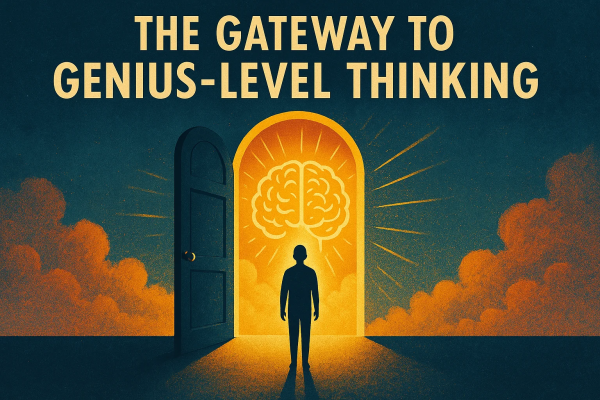
The strangest secret is that genius has always been available to anyone.
Because it already resides within you.
The two have always been confused as being the same, but in fact, they are both different styles of thinking. High intelligence, IQ, comes from the rational mindset and encompasses areas of reasoning such as logic, cognitive ability, critical analysis, reasoning, conceptual thinking, spatial cognition, verbal and nonverbal subtests, quantitative reasoning, visual-spatial processing, working memory, and fluid reasoning. However, none of this accommodates for any form of measurement for creative or intuitive thinking. It’s why the standard Stanford-Binet Intelligence Quotient test has no measurement for intuitive or creative thinking.
Genius, on the other hand, is everything opposite. It comes from the intuitive mindset. It incorporates bold, out of the box, non-linear, imaginative, adventurous, and connective, visionary thinking. It’s where fantasy becomes reality.
And while there can be crossover in both areas of thinking, genius tends to be the more powerful area when it comes to developing new ideas, concepts, or even inventions.
Think of it like this: In terms of genius, there is no absolute right or wrong, but there is a propensity to explore, imagine, create, philosophize, and ponder, which are all related to the intuitive mindset. Perhaps in this light, talent is ability, whereas genius is discovery.
The closest we have gotten to understanding genius resides within the intuitive, divergent, playful, and fantasy mindset while incorporating areas of creativity, imagination, curiosity, wonderment, philosophical
contemplation, and inventiveness.
Einstein, Faraday, and Ramanujan were all genius thinkers. The people who vetted their work, Henry Siedentopf, James Clerk Maxwell, and G.H. Hardy were all highly intelligent men who later verified their theories and ideas to be sound.
But genius is found in all of us. Everyone has some level of genius proclivity. Everyone. Because we live in a society focused on fitting in and becoming part of the ‘norm,’ most have stifled or forgotten how to access their own unique intuitive genius. But rest assured, it is not lost, merely dormant.
As Sir Ken Robinson, an internationally recognized advisor on education and renowned creativity expert says, “We are all born with a powerful intuitive ability that society teaches out of us at a very young age.”
That’s why it seems so rare and unique when someone displays signs of highly creative genius. But this gift is available to anyone and everyone. You just have to learn how to access and reacquaint yourself with your truest nature.
“The intuitive mind is a sacred gift
and the rational mind is a faithful servant.
We have created a society that honors the servant
and has forgotten the gift.”
~ Albert Einstein
To fully understand the amazing power of intuitive genius, you need to begin learning how to cultivate your intuition, and not just to simply intellectualize what genius is.
An analogy would be the difference between intellectually understanding everything about the painting of the Mona Lisa, the lighting, the brush strokes, the blending of colors. But until you are actually standing in front of it, you can’t fully experience how incredible it makes you feel. I want to teach you how to experience life and creativity using your intuitive mind.
Unlike the Binet-Simon intelligence quotient test, developed by Alfred Binet and Théodore Simon in 1905, which became the first test to measure human intelligence, and later became The Stanford–Binet Intelligence Scales, which measures one’s aptitude in the area of rational thinking. It focuses specifically on all cognitive facets of the rational mindset:
Logic, cognitive ability, critical analysis, reasoning, conceptual thinking, spatial cognition, verbal and nonverbal subtests, quantitative reasoning, visual-spatial processing, working memory, and fluid reasoning.
However, none of this accommodates for any form of measurement for highly creative or intuitive thinking, which so many disruptive “geniuses” use religiously.
Whereas arts, sports, entertainment, music, fashion, design, invention, philosophy, and exploration are all fields that require one to utilize their creative thinking.
There are tests for creativity, curiosity, and intelligence. There is even a test for one’s vocational aptitude in the workplace (Myers-Briggs), but currently, there are no viable tests for understanding how to successfully and fully access one’s true genius.
Until now.
Within these pages are the tools you need to understand your own creative genius and get you back on track to understanding how to cultivate these natural abilities.
The test is short, yet powerful. The results will take you on a new journey to discovering your real nature and how to unlock your own brand of genius-brilliance.

Areas of Creativity | Types of Creativity | Types of Genius |
Design | Imagination | Explorative |
Genius Qualities | ||
Intuition – Seems to know without quantifiable evidence Creativity – Ability to make or find a new way to see the world – Designer Dreamer – Philosophical, whimsical, cloud watcher, fantasize Philosophical – Contemplative, ponders, theorizes, questions Divergent Thinker – Expansive, non-conclusive, open, limitless, free-flowing Playfulness – Child-like in their approach and mindset Curiosity – Wonderment, observation, and questioning – Taking nothing for granted or preconception Exploration – Adventurous Abstract reasoning – Looks at the odd or unobvious aspects Inventiveness – Cleaver, artistic Messy – Not worried about practical ideas or responsibilities – Lost in thought Undeterred – Non-emotive during pursuit Myopic – Blocks out distractions Unique vision – Has a unique vision or perspective of what they are looking for or how it should be Experimental – Doesn’t mind getting their hands dirty Connective – Able to connect unlikely parings No ego – Ego cannot exist in the same realm of creativity and inventiveness | ||